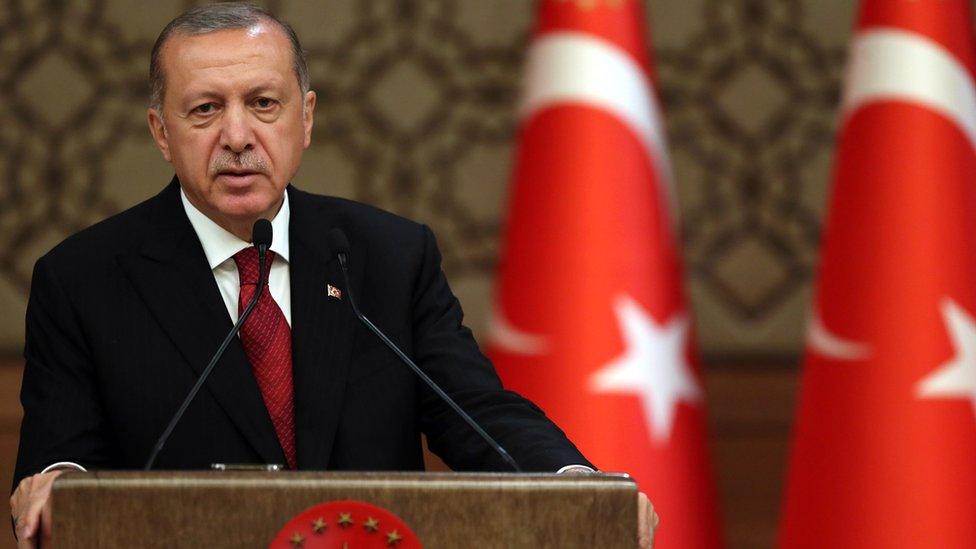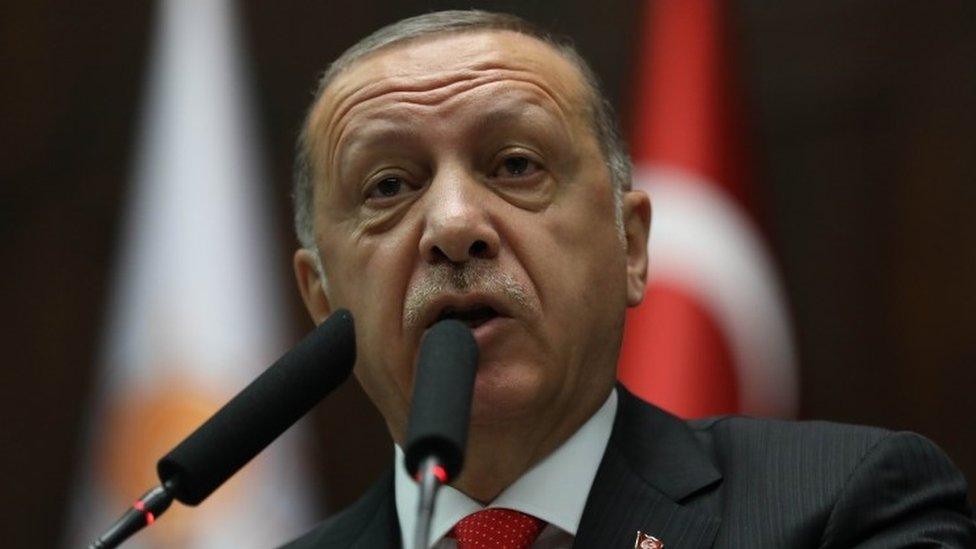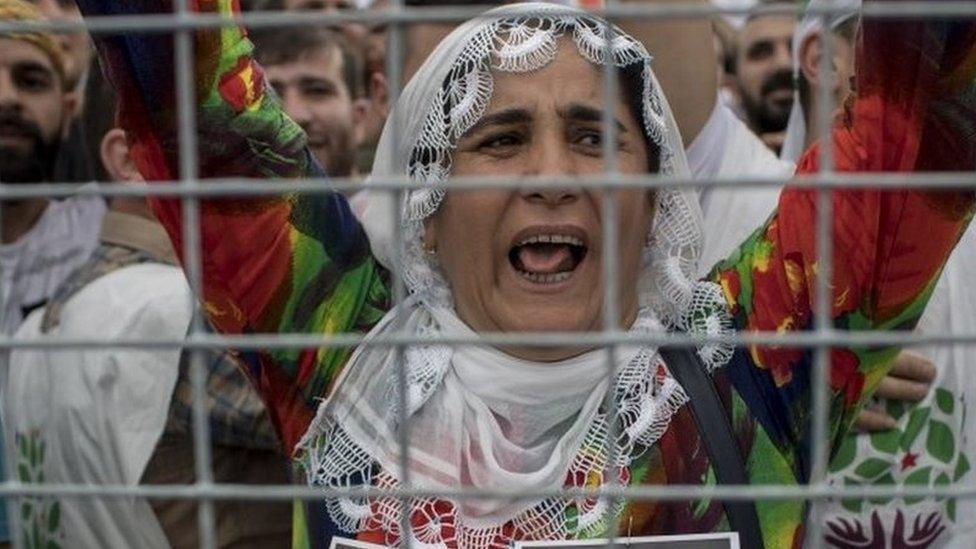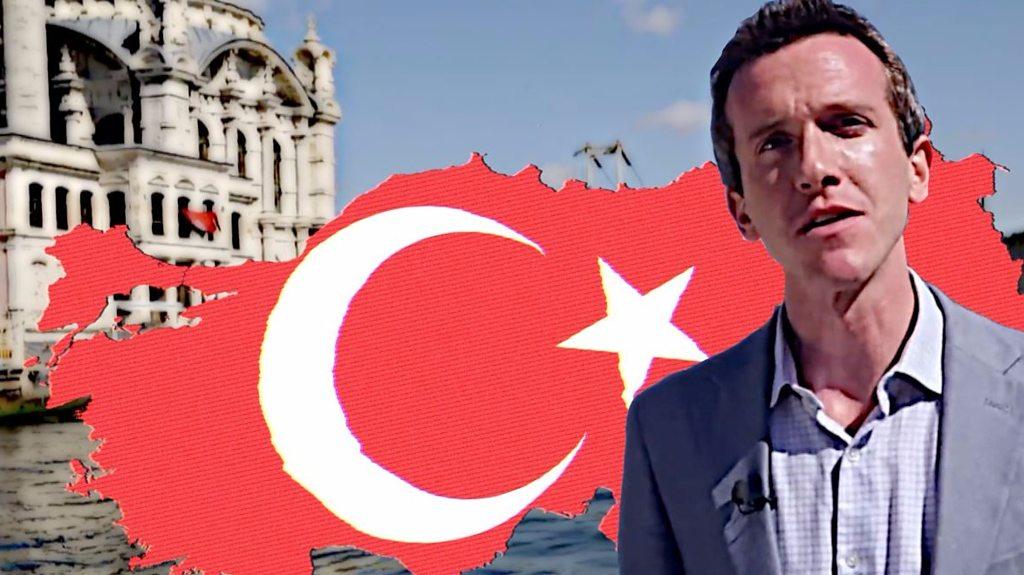Turkey's Erdogan son-in-law made finance minister amid nepotism fears
- Published

Mr Erdogan told guests at the presidential palace that Turkey was "making a new start"
Turkey's president Recep Tayyip Erdogan has named his son-in-law as the country's finance minister after being sworn in to another five-year term.
The appointment of Berat Albayrak appeared to rattle the markets amid concerns of nepotism in the upper echelons of power.
Mr Erdogan, who was re-elected last month, has vowed to "propel our country forward" with his sweeping new powers.
Opponents fear his new role, executive president, will destroy democracy.
Mr Erdogan's new position marks a transition away from a parliamentary system and the office of prime minister, which has been in place since the foundation of the modern Turkish republic 95 years ago.
It allows him to appoint ministers and vice-presidents and intervene in the legal system.
After taking the oath of office in parliament on Monday, Mr Erdogan told guests at the presidential palace in the capital, Ankara, that Turkey was "making a new start".
"We are leaving behind the system that has in the past cost our country a heavy price in political and economic chaos," he said.

Erdogan - the arch polariser
By BBC Turkey correspondent Mark Lowen
For 95 years, Turkey was a parliamentary republic, its Grand National Assembly the heart of power. No more. From Monday, it is a presidential republic under its omnipotent leader Recep Tayyip Erdogan.
Having won re-election, he has now become head of the executive, controlling the army and intelligence agency, able to issue decrees and choose most senior judges.
To his supporters, it is a stronger political system. To his opponents, it is one-man rule and the death of Turkish democracy.
Mr Erdogan is now the country's most powerful leader since Ataturk: modern Turkey's secular founding father, who saw Turkey as part of the west.
But President Erdogan has put religion at the heart of the country and has distanced it from the West. Few European leaders attended his inauguration - only those from Hungary and Bulgaria - with most from Africa and the Middle East: a sign of his geopolitical realignment.
Mr Erdogan is the arch polariser and views today are again divided. For some, it is the coronation of a new Turkey. For others, it's the dismantlement of Ataturk's republic.

After news emerged of the appointment of Mr Erdogan's son-in-law, the Turkish lira lost more than 3% of its value.
Berat Albayrak, the 40-year-old husband of the president's eldest daughter, has been energy minister since 2015 but his promotion has raised fears of nepotism at the top.
During the election he was reported to have complained that the sharp drop in the lira this year had been prompted by a "very open and clear operation" against Turkey.
It has also emerged that Mehmet Simsek, a former banker at Merrill Lynch who acted as deputy prime minister in Turkey's previous government, will not hold a position in the new cabinet.
In another key change announced by Mr Erdogan on Monday, military chief Gen Hulusi Akar was named as the new defence minister.
Meanwhile Mevlut Cavusoglu remains in his post as foreign minister.
Last month Mr Erdogan was re-elected with 53% of the vote. He has presided over a strong economy and built up a solid support base.
But he has also polarised opinion, cracking down on opponents and putting some 160,000 people in jail.
- Published8 July 2018

- Published25 June 2018

- Published18 June 2018

- Published8 June 2018

- Published22 August 2023
